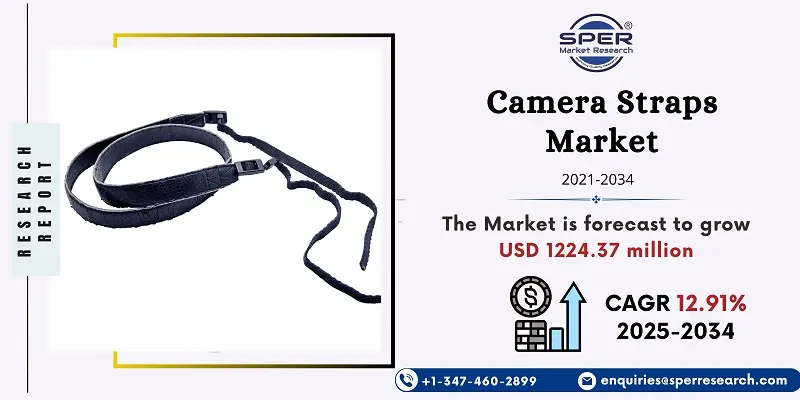
Camera Straps Market Size, Trends, Growth, Revenue, Challanges, Demand and Future Outlook
Camera Straps Market Growth, Size, Trends Analysis - By Application, By Material, By Distribution Channel - Regional Outlook, Competitive Strategies and Segment Forecast to 2034
| Published: Jan-2025 | Report ID: FMCG2502 | Pages: 1 - 247 | Formats*: |
| Category : Consumer & Retail | |||


- In July 2023, Peak Design’s distributor, the Transcontinenta Group, launched the ‘Peak Design Micro Clutch’ hand strap for small mirrorless cameras through a Kickstarter campaign. It includes a machined aluminum baseplate, hidden attachment tool for battery access, and a removable tripod plate compatible with PD, Capture, and Arca-Swiss tripods.
| Report Metric | Details |
| Market size available for years | 2021-2034 |
| Base year considered | 2024 |
| Forecast period | 2025-2034 |
| Segments covered | By Application, By Material, By Distribution Channel |
| Regions covered | North America, Latin America, Asia-Pacific, Europe, and Middle East & Africa |
| Companies Covered | SAMSUNG, FUJIFILM Corporation, Black Rapid, Inc, Peak Design, ALTURAPHOTO, gordy's camera straps, Movo, OP//TECH USA, COOPH Cooperative of Photography GmbH, ORIGINAL FUZZ. |
- Global Camera Straps l Market Size (FY’2021-FY’2034)
- Overview of Global Camera Straps Market
- Segmentation of Global Camera Straps Market By Application (Commercial, Personal)
- Segmentation of Global Camera Straps Market By Material (Nylon, Polyester, Fabric, Cotton, Others)
- Segmentation of Global Camera Straps Market By Distribution Channel (Online, Offline)
- Statistical Snap of Global Camera Straps Market
- Expansion Analysis of Global Camera Straps Market
- Problems and Obstacles in Global Camera Straps Market
- Competitive Landscape in the Global Camera Straps Market
- Details on Current Investment in Global Camera Straps Market
- Competitive Analysis of Global Camera Straps Market
- Prominent Players in the Global Camera Straps Market
- SWOT Analysis of Global Camera Straps Market
- Global Camera Straps Market Future Outlook and Projections (FY’2025-FY’2034)
- Recommendations from Analyst
1.1. Scope of the report1.2. Market segment analysis
2.1. Research data source
2.1.1. Secondary Data2.1.2. Primary Data2.1.3. SPERs internal database2.1.4. Premium insight from KOLs
2.2. Market size estimation
2.2.1. Top-down and Bottom-up approach
2.3. Data triangulation
4.1. Driver, Restraint, Opportunity and Challenges analysis
4.1.1. Drivers4.1.2. Restraints4.1.3. Opportunities4.1.4. Challenges
5.1. SWOT Analysis
5.1.1. Strengths5.1.2. Weaknesses5.1.3. Opportunities5.1.4. Threats
5.2. PESTEL Analysis
5.2.1. Political Landscape5.2.2. Economic Landscape5.2.3. Social Landscape5.2.4. Technological Landscape5.2.5. Environmental Landscape5.2.6. Legal Landscape
5.3. PORTERs Five Forces
5.3.1. Bargaining power of suppliers5.3.2. Bargaining power of buyers5.3.3. Threat of Substitute5.3.4. Threat of new entrant5.3.5. Competitive rivalry
5.4. Heat Map Analysis
6.1. Global Camera Straps Market Manufacturing Base Distribution, Sales Area, Product Type6.2. Mergers & Acquisitions, Partnerships, Product Launch, and Collaboration in Global Camera Straps Market
7.1. Commercial7.2. Personal
8.1. Nylon8.2. Polyester8.3. Fabric8.4. Cotton8.5. Others
9.1. Online9.2. Offline
10.1. Global Camera Straps Market Size and Market Share
11.1. Asia-Pacific
11.1.1. Australia11.1.2. China11.1.3. India11.1.4. Japan11.1.5. South Korea11.1.6. Rest of Asia-Pacific
11.2. Europe
11.2.1. France11.2.2. Germany11.2.3. Italy11.2.4. Spain11.2.5. United Kingdom11.2.6. Rest of Europe
11.3. Middle East and Africa
11.3.1. Kingdom of Saudi Arabia11.3.2. United Arab Emirates11.3.3. Qatar11.3.4. South Africa11.3.5. Egypt11.3.6. Morocco11.3.7. Nigeria11.3.8. Rest of Middle-East and Africa
11.4. North America
11.4.1. Canada11.4.2. Mexico11.4.3. United States
11.5. Latin America
11.5.1. Argentina11.5.2. Brazil11.5.3. Rest of Latin America
12.1. SAMSUNG
12.1.1. Company details12.1.2. Financial outlook12.1.3. Product summary12.1.4. Recent developments
12.2. FUJIFILM Corporation
12.2.1. Company details12.2.2. Financial outlook12.2.3. Product summary12.2.4. Recent developments
12.3. Black Rapid, Inc
12.3.1. Company details12.3.2. Financial outlook12.3.3. Product summary12.3.4. Recent developments
12.4. Peak Design
12.4.1. Company details12.4.2. Financial outlook12.4.3. Product summary12.4.4. Recent developments
12.5. ALTURAPHOTO
12.5.1. Company details12.5.2. Financial outlook12.5.3. Product summary12.5.4. Recent developments
12.6. gordy's camera straps
12.6.1. Company details12.6.2. Financial outlook12.6.3. Product summary12.6.4. Recent developments
12.7. Movo
12.7.1. Company details12.7.2. Financial outlook12.7.3. Product summary12.7.4. Recent developments
12.8. OP//TECH USA
12.8.1. Company details12.8.2. Financial outlook12.8.3. Product summary12.8.4. Recent developments
12.9. COOPH Cooperative of Photography GmbH
12.9.1. Company details12.9.2. Financial outlook12.9.3. Product summary12.9.4. Recent developments
12.10. ORIGINAL FUZZ
12.10.1. Company details12.10.2. Financial outlook12.10.3. Product summary12.10.4. Recent developments
12.11. Others
SPER Market Research’s methodology uses great emphasis on primary research to ensure that the market intelligence insights are up to date, reliable and accurate. Primary interviews are done with players involved in each phase of a supply chain to analyze the market forecasting. The secondary research method is used to help you fully understand how the future markets and the spending patterns look likes.
The report is based on in-depth qualitative and quantitative analysis of the Product Market. The quantitative analysis involves the application of various projection and sampling techniques. The qualitative analysis involves primary interviews, surveys, and vendor briefings. The data gathered as a result of these processes are validated through experts opinion. Our research methodology entails an ideal mixture of primary and secondary initiatives.



Frequently Asked Questions About This Report
PLACE AN ORDER
Year End Discount
Sample Report
Pre-Purchase Inquiry
NEED CUSTOMIZATION?
Request CustomizationCALL OR EMAIL US
100% Secure Payment






Related Reports
Our Global Clients
Our data-driven insights have influenced the strategy of 200+ reputed companies across the globe.




















